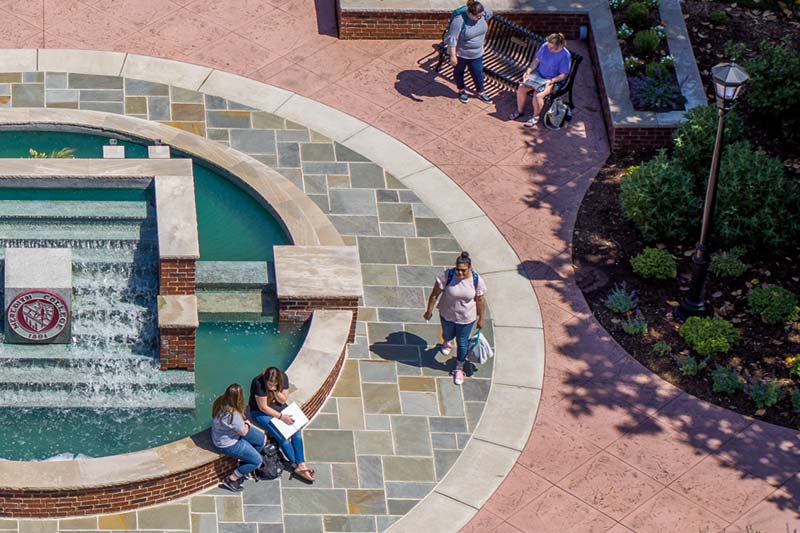
Strong students transfer to Meredith every fall and spring term, and for good reason. Meredith is a signatory school on articulation agreements with the North Carolina Community College system, which makes it easier to complete your degree here. We have scholarships just for transfer students. And our friendly campus makes it easy for transfer students to find their place in the Meredith community.
Still, when I meet with students who are thinking about transferring to Meredith, they often have misconceptions about the transfer process and what it’s like to make that transition. I wrote this blog post to correct some of the most common myths students have about transferring.
If you ask students what they like most about Meredith, chances are they’ll mention our strong sense of community. Yes, we have small class sizes, which can make it easier to meet other students who share your interests. But Meredith’s welcoming community extends far beyond the classroom – it’s truly a defining characteristic of our experience for all students, including those who transfer.
In addition, to help facilitate your transition as a transfer student, you’ll participate in New Student Orientation with a smaller sub-group of transfer students, which will provide you with an immediate opportunity to start making connections – both with other new transfer students and current Meredith students.
Meredith’s personal approach to your education includes a desire to help you pursue more than one interest. Many of our students have multiple majors and/or minors. As a transfer student, you will work closely with academic and faculty advisors who can help you plan your schedule to make the most of your time at Meredith and explore multiple areas of study if that’s your goal.
More than a third of Meredith students study abroad, including transfer students like Marissa Hurtado, who completed an internship in Paris, France. As noted in the previous myth, our advising staff can help you make an academic plan to accommodate your desire to study abroad.
In addition to need-based assistance that you can access by completing the Free Application for Federal Student Aid (FAFSA), Meredith has a range of merit scholarships to help fund your education.
Transfer Tuition Grants and Merit Academic Scholarships recognize transfer students whose previous college records reflect superior academic ability, achievement and leadership potential. Those awards range from $7,000 – $12,000, and the award can be renewed each year. The Phi Theta Kappa (PTK) scholarship, which awards $5,000 per year to students who have been inducted into the PTK Honor Society, can be combined with other assistance and also renews.
Academically talented and motivated transfer students are absolutely encouraged to apply for the Honors program at Meredith. Participation in the Honors program at your previous institution is not required, but you must have completed at least 15 credit hours at a previous institution, and have at least 60 credit hours remaining at Meredith. Your transfer admissions counselor can help you determine if the honors program is right for you.
In addition, as a transfer student you have other opportunities to challenge yourself academically, such as by conducting undergraduate research or pursuing an internship.
Our transfer students frequently choose to live on campus, whether in a residence hall or The Oaks, our campus apartments for juniors and seniors. Some, like Meredith White, ’15, take on a leadership role as a Resident Assistant.
When you apply Meredith, you are applying to the College rather than a particular major or school. Unlike some larger institutions where you may have to wait to be admitted into a particular school or major, this gives you the freedom to continue to explore areas of study, with the guidance of your faculty advisor. If you are admitted and already have an intended major in mind, you will begin working with a faculty advisor from that major right away to plan out your first semester’s courses and your path to graduation.
These are just some of the myths I encounter in my work with transfer students. If you have other concerns, let’s chat! Schedule a visit to Meredith and learn about how we can help you identify your strengths, complete your degree in a timely fashion, and prepare for the life you want to lead after graduation.
Sign up for our blog and get tips to help you write a strong college application essay. You’ll also receive valuable information every week to help you with your college search, including how to tell if a school is a good fit, how to pay for college, and more!
Share This Page
Office of Admissions
1st Floor, Johnson Hall
1-800-MEREDITH
(919) 760-8581
(919) 760-2348
admissions@meredith.edu
PRINCETON REVIEW
U.S. NEWS
NICHE
3800 Hillsborough Street Raleigh, NC 27607-5298 | (919) 760-8600 Fax: (919) 760-8330 | © 2024 All Rights Reserved.